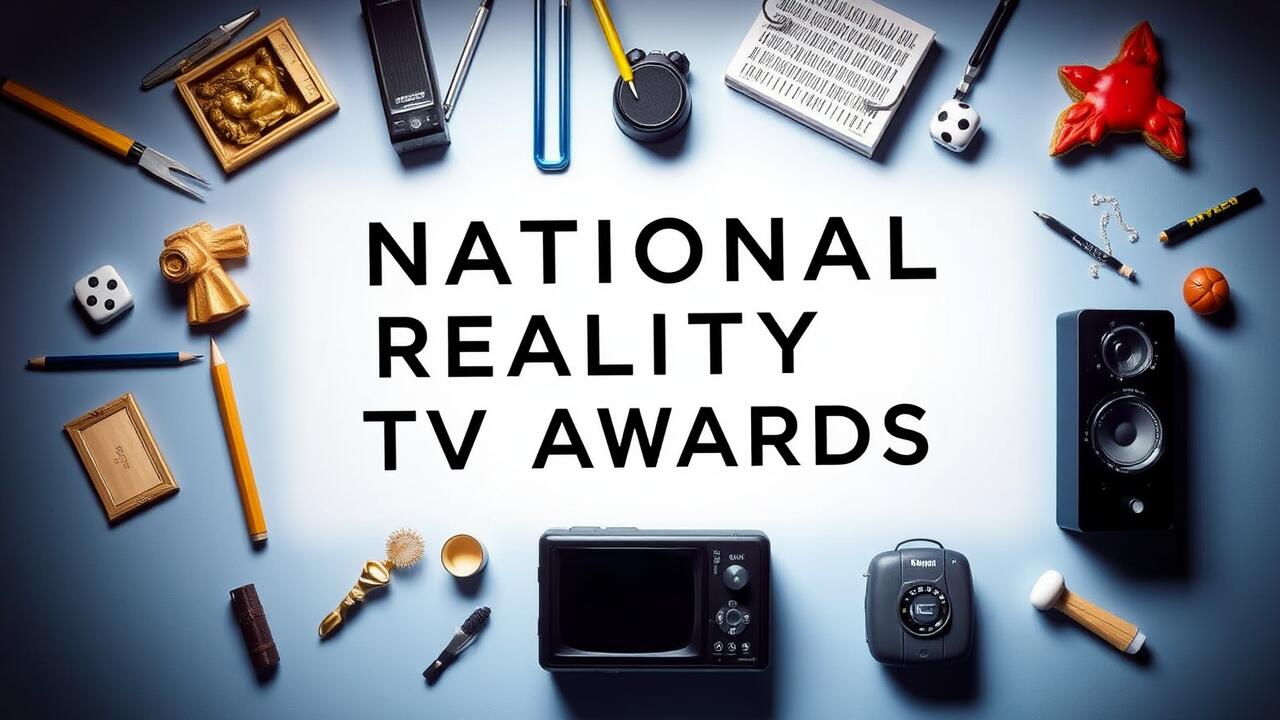Reality Television Awards
In the whirlwind of recent years, reality television has experienced a fascinating metamorphosis, with award categories blossoming into a kaleidoscope that mirrors the genre’s vibrant diversity. New classifications have burst forth like wildflowers after a rainstorm, shining a spotlight on sub-genres such as social media influencers and digital content creators—those crafty architects of niche programming targeting specific corners of audience interest. This evolution is not just happenstance; it resonates deeply with our society’s pivot towards online platforms and the meteoric rise of reality stars who dominate various digital landscapes, reflecting an acute sensitivity to shifting cultural tides.
But wait—there’s more! These awards now frequently embrace collaborative endeavors among contestants, recognizing that teamwork and rivalry often intertwine in this realm of unscripted drama. Honors dedicated to unscripted ensemble casts or community-driven projects underscore the growing appreciation for interpersonal connections and shared stories within reality programming. Such shifts herald a richer understanding of what captivates viewers in this dynamic arena—a departure from merely celebrating individual accolades toward valuing collective narratives that resonate on multiple levels. The landscape is changing, indeed!
Popular Categories That Have Emerged
In recent times, the realm of reality television awards has morphed into a vibrant tapestry, mirroring the eclectic tastes of its audience. New categories—like Best Competition Show and Best Lifestyle Series—have surged in popularity, shining a spotlight on the format-driven programming that captivates viewers. Delving deeper, we see specialized segments focusing on specific demographics or themes; think along the lines of Best Dating Show or Best Home Renovation Series. This shift speaks volumes about an industry evolving toward inclusivity in its nominations—a veritable feast for diverse interests!
But wait, there’s more! A fascinating trend is rising from this expansive landscape: awards dedicated to social impact and representation are making their mark. With categories such as Best Social Justice Programming and Most Diverse Cast emerging from the shadows, we witness a growing recognition of cultural relevance within reality TV narratives. These honors do more than just applaud shows—they underscore their potential influence on societal conversations while nudging producers towards crafting content that resonates with broader audiences. This thematic richness not only amplifies our celebration of reality television but also empowers creators to push boundaries in innovative ways as they navigate the ever-evolving dynamics of viewer engagement!
The Role of Viewers in Reality TV Awards
Viewers wield a remarkable power in the unfolding drama of reality television awards, their influence rippling through the very fabric of popularity and credibility. With every vote cast, fans don’t just express preferences; they sculpt the narrative, deciding which shows, contestants, or unforgettable moments bask in the glow of recognition. This pulsating interaction fosters a vibrant community where audiences unite around their beloved picks, sparking discussions that can catapult certain programs into the spotlight.
And then there’s social media—oh, how it transforms participation! The digital age has flung wide open the doors to engagement; voting is now as easy as a few clicks away. Fans share fiery opinions and launch passionate campaigns for their favorites with unprecedented fervor. This explosion of interactive energy not only cranks up the excitement surrounding awards but also nudges producers and networks to heed audience desires more than ever before. We find ourselves in an exhilarating whirlwind where viewer input reshapes what success looks like in this dynamic realm of reality television—a landscape that’s constantly evolving under our watchful eyes!
Audience Participation and Voting Methods
The very fabric of reality television awards has been irrevocably altered by the infusion of audience participation, a twist that reshapes how winners emerge from the shadows. Viewers now wield power like never before, steering outcomes through an array of voting methods—think phone calls, text messages, and those ubiquitous online polls. These systems are crafted not merely to engage but to spark fervor, allowing fans to forge intimate connections with their beloved shows and contestants. Picture this: social media voting making waves as platforms like Twitter or Instagram become battlegrounds for real-time reactions and opinions.
But wait! There’s more—the ease of these voting mechanisms invites a kaleidoscope of demographics into the fold. By lowering barriers for participation, awards shows amplify authenticity in their results; they morph into mirrors reflecting the varied tastes across a broad spectrum of viewers. This seismic shift toward direct viewer engagement doesn’t just stoke excitement—it throws down gauntlets in maintaining fairness and transparency throughout the chaotic whirlwind of votes cast. And as technology surges forward at breakneck speed, we can only anticipate how audience engagement will evolve further still—stretching what we know about traditional award ceremonies to their very limits.
| Award Show | Voting Method | Viewer Engagement Platform | Year Introduced |
|---|---|---|---|
| The MTV Movie & TV Awards | Online Polling | 2010 | |
| The People’s Choice Awards | Text Messaging | 1975 | |
| American Idol | Phone Voting | 2002 | |
| The Billboard Music Awards | Online Voting | Billboard.com | 1990 |
| The Voice | App Voting | Official App | 2011 |
Criticism of Reality Television Awards
The burgeoning spotlight on reality television awards has ignited a firestorm of critique among industry veterans and TV pundits alike. Doubters assert that these accolades often elevate sensationalism above true talent, creating a landscape where the thirst for entertainment eclipses quality content. The result? Performances that many deem superficial garner recognition, while the intricate artistry woven into storytelling and character development—hallmarks of scripted genres—seems to fade into the background.
Moreover, naysayers point to a troubling lack of transparency surrounding voting processes and nomination criteria. It’s hard not to feel that many awards are puppets danced by network affiliations or slick marketing ploys rather than genuine meritocracy. This skepticism doesn’t just linger; it prompts deeper reflections on the authenticity of honors bestowed upon reality shows and raises broader concerns about how these trends shape audience perceptions—and ultimately redefine standards in television as we know it.
Common Arguments Against the Awards
Oh, the critics of reality television awards! They’re quick to argue that these glittering ceremonies, oh so flashy and entertaining, often sacrifice genuine artistic merit on the altar of spectacle. Unlike their scripted counterparts—those traditional shows weaving intricate narratives with finesse—reality TV revels in sensationalism and orchestrated drama. This relentless chase for shock value? It can skew the very essence of talent and creativity in the industry, casting a shadow over those earnest creators laboring away in the realm of conventional television.
Then there’s that recurring bone of contention: viewer voting and audience participation shaping who takes home those coveted trophies. The popular vote—a double-edged sword! It can twist recognition into something almost unrecognizable, favoring contestants basking in social media glory or boasting devoted fan bases while potentially sidelining individuals brimming with real skill or authenticity. Such dynamics spark a flurry of questions about award integrity: Do these accolades genuinely mirror programming quality? Or are they simply pandering to the loudest voices rather than honoring truly deserving talents? Ah, what a tangled web we weave!
Future of Reality Television Awards
The realm of reality television awards is on the brink of an exhilarating transformation in the not-so-distant future. With viewing habits evolving like a chameleon and technology racing forward, we can expect these awards shows to weave in interactive elements that ignite audience engagement—far beyond the staid old voting methods we’ve come to know. The meteoric rise of streaming platforms is shaking up the nomination landscape too, birthing fresh categories that celebrate the kaleidoscope of genres within reality TV. This responsiveness to shifting trends could pave the way for a more inclusive atmosphere, drawing in a wider swath of viewers.
Peering into what lies ahead, it’s clear that reality television’s international appeal will dramatically reshape how these award ceremonies are structured and judged. As content crosses borders with increasing frequency, we might see new cross-border categories sprout up—honoring talent and productions hailing from diverse corners of the globe. Such evolution doesn’t just fortify connections across cultures; it also opens doors for collaboration and recognition on an expansive scale. As these dynamic changes unfold, the enduring relevance of reality television awards will rest heavily on their ability to pivot alongside audience tastes and industry currents.
Predictions for Upcoming Changes and Trends
The realm of reality television awards is poised for a remarkable transformation in the years ahead, teetering on the brink of something extraordinary. With streaming platforms surging to unprecedented heights, we may soon witness an awards landscape that embraces an eclectic mix of programming—melding not just the familiar faces of cable and network shows but also the vibrant tapestry of digital content. Imagine new categories emerging from this shift, each crafted to spotlight those distinctive features that set streaming reality series apart: think interactive elements that pull viewers into the narrative and engagement metrics that dance across digital realms.
And let’s not forget the thrilling innovations brewing in audience participation! As technology leaps forward, who knows what immersive and dynamic methods will redefine how viewers cast their votes? Picture it—blockchain and cryptocurrency weaving their way into voting systems, ushering in a new era marked by transparency and security. This evolution would do wonders for viewer experience, forging a more intimate connection between audiences and their beloved shows—and perhaps even catapulting fan-favorite personalities into dazzling recognition. The future holds endless possibilities; hold onto your remotes!
- New award categories will likely emerge specifically for streaming reality shows.
- Increased focus on interactive elements within programming could enhance viewer engagement.
- Advances in technology may lead to innovative audience participation methods for voting.
- The incorporation of blockchain and cryptocurrency could revolutionize voting systems in awards shows.
- A greater emphasis on transparency in the voting process might strengthen viewer trust.
- Enhanced viewer experiences could lead to stronger connections between audiences and reality TV personalities.
- Expect shifts in industry standards as streaming platforms redefine what constitutes success in reality television.
The Global Impact of Reality Television Awards
Reality television awards have undeniably reshaped the global TV scene, leaving an indelible mark on how viewers engage with content across a kaleidoscope of cultures. Nations far and wide frequently snatch up trending formats, weaving in local stars or contestants to infuse a familiar flair, thereby amplifying these shows’ resonance within their own audiences. The spotlight cast by international reality awards can spark dynamic partnerships between production houses that span continents, birthing hybrid formats designed to captivate a worldwide viewership.
The allure tied to these accolades acts as a potent catalyst for marketing strategies, prompting networks to dive headfirst into the pool of reality programming. Award ceremonies erupt with excitement, creating waves of buzz that elevate not just the individual shows but also bolster the entire genre’s standing in popular culture. This cascading effect often leads to a surge in local adaptations springing forth like wildflowers after rain—ultimately broadening the footprint and sway of reality TV across the globe!
How Awards Influence International TV Markets
Reality television awards have emerged as a formidable force, reshaping the landscape of global TV markets with an almost frenetic energy. They serve as a dynamic stage where shows can catapult to international acclaim, igniting a fervor that compels producers to whip up local renditions of those hit formats. Nations frequently scramble to license these award-winning gems, eager to ride the coattails of established popularity and viewer enthusiasm stirred by such accolades.
Moreover, these awards act as potent catalysts for cross-border collaborations among production houses. Networks across the globe are keenly attuned to the successful trends and viewer cravings illuminated by these ceremonies—ready to pounce on any opportunity. Consequently, award-winning reality shows often spark alliances that weave together resources, talents, and expertise from a tapestry of diverse markets. The ripple effect? A bolstered quality and richness in content available for audiences worldwide—transforming reality television into an indispensable thread in the fabric of international entertainment culture!
Conclusion
Reality television awards have undergone a remarkable transformation, mirroring the ever-shifting terrain of entertainment and what viewers crave. These ceremonies do more than just spotlight individual triumphs; they unveil sweeping trends that pulse through the genre itself. As fresh categories and inventive formats burst onto the scene, these accolades evolve right along with them, embracing a rich tapestry of recognition for diverse facets of reality programming.
But wait—there’s more! The sway of reality television awards stretches far beyond simple trophies on a shelf. They ignite audience engagement, mold industry benchmarks, and play a pivotal role in the global TV landscape. As they react to the ebb and flow of viewer desires and preferences, tomorrow’s awards will need to stay relevant while simultaneously propelling innovation within this dynamic reality TV sphere.







